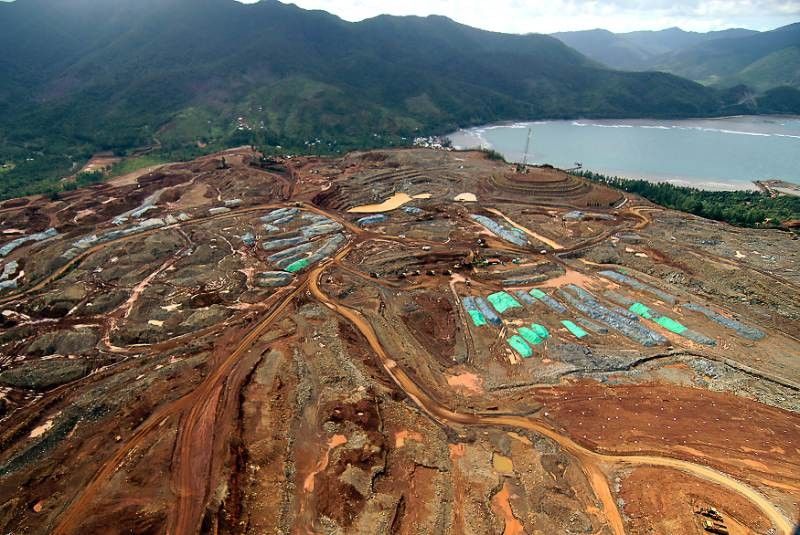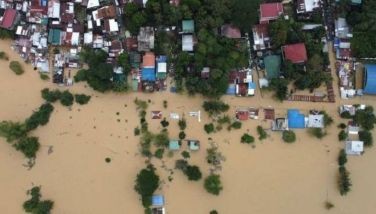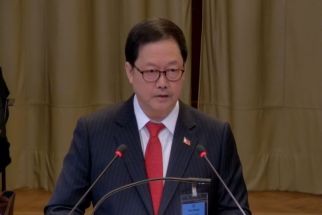Mining takes star role in last leg of DENR's nationwide consultations

CAGAYAN DE ORO, Philippines — Mining became one of the major topics in the final leg of the Department of Environment and Natural Resources’ multi-stakeholder dialogue in Mindanao last week, with mining companies sharing how they have been managing the environmental and social aspects of their operations.
As police broke up the human wall of anti-mining residents of Romblon's Sibuyan Island in Luzon, the mining industry took the stage at the Limketkai Luxe Hotel in Cagayan de Oro last Friday and spoke about what they said was responsible mining.
Rocky Dimaculangan, vice president for communications of the Chamber of Mines of the Philippines, said the association’s members have adopted the Towards Sustainable Mining (TSM) standard that was developed by the Mining Association of Canada in 2004.
TSM requires mining firms to annually assess their facilities’ performance in key areas such as tailings management, community outreach, safety and health, biodiversity conservation, crisis management, and energy use and greenhouse gas emissions management.
"The Chamber of Mines of the Philippines is in tune with the times and our members are ready to contribute our share to meet the global demand for green technologies through sustainable mining practices," added Dimaculangan, who is also the national coordinator for TSM.
Mark Vincent Junel Felias, officer-in-charge of community relations and development department of Taganito Mining Corp., noted that mining persists "because it is able to provide meaningful and tangible support not only to national interests and agenda, but also towards the needs of many remote communities where life may be different and difficult."
TMC is a subsidiary of Nickel Asia Corp., which operates in Claver, Surigao del Norte.
Jasmin Dansigan Goriano, a member of the Mansaka indigenous peoples community in Davao De Oro, said their partnership with Apex Mining Co., Inc. "has given us the opportunity to have a better life."
She added the firm has made community livelihood opportunities, and access to healthcare and education available.
Platform needed for objections to mining
Bishop Cerilo Casicas, who heads the Diocese of Marbel where the Tampakan open-pit mine is located, said the DENR's attempt to gather the insights of different stakeholders is a good move. He, however, said it was sad that it was largely the views of the mining industry that were reflected in the session.
"Maybe they can also give those in Mindanao who have reservations and strong objections against mining an opportunity to be heard in the same level, not only in breakout rooms, but in the plenary," Casicas said in Filipino on the sidelines of the forum.
He also urged Environment Secretary Toni Yulo-Loyzaga or other agency officials to have a direct dialogue with groups opposed to mining.
Casicas stressed he has reservations about the concept of "responsible" mining because the standards are set by the mining industry.
"All stakeholders should talk and set the standards high. And before we set that, there should be a moratorium on mining first or status quo, do not expand," he said.
Environmental groups and host communities have pointed out that the extraction of minerals is displacing people and disrupting their livelihoods. Mining also drives deforestation and the climate crisis, and threatens water sources.
On the island of Sibuyan, residents are resisting the mining exploration activities of Altai Philippines Mining Company. Operations of the mining firm have reportedly been suspended until concerns raised in protests are addressed. The company told Philstar.com on Sunday, however, that it has yet to receive Notices of Violation — which come with suspension orders — issued by the DENR.
DENR: Here to listen
The Philippines is the fifth most mineral-rich country in the world, producing minerals such as gold, chromium, cobalt, copper, nickel and silver.
Revitalizing the mining sector—even though the industry only accounts for less than one percent of the country’s gross domestic product—is a priority of the Marcos administration following the Duterte administration's lifting of a moratorium on new mining projects.
Yulo-Loyzaga said last week that the DENR will engage with all stakeholders—whether they support mining or not.
"We’re here to listen and until we can be satisfied that we’ve heard all stakeholders, we cannot achieve a balance in terms of the approach. Geographically and socially, [things are] different. So these complexities need to be addressed in whatever approach that we will take moving forward," the DENR chief said.
"Let me say this: we need minerals. You all know that. How we balance that really depends on the context that we’re actually faced with," she added.
The Cagayan de Oro leg completed the department’s nationwide consultations on environmental governance, ecotourism, agriculture, food security, forest and land management, climate and disaster resilience, and mining.
On the first day of the forum, Ateneo de Davao University president Joel Tabora urged the environment department to craft decisions that are guided by the voices of people on the ground.
"The DENR cannot just be a government agency to exploit the natural resources of the Philippines in favor of the economy and of the private interests that drive this… [They should] make sure the society and the planet are not killed by the vicious technocratic paradigm driving the economy," Tabora said.
"A fundamental component of the DENR’s research-based and centralized decision making needs to be to listen to the cry of the environment, in the tears and frustration of people committed to preserving the environment on the ground."
- Latest


























